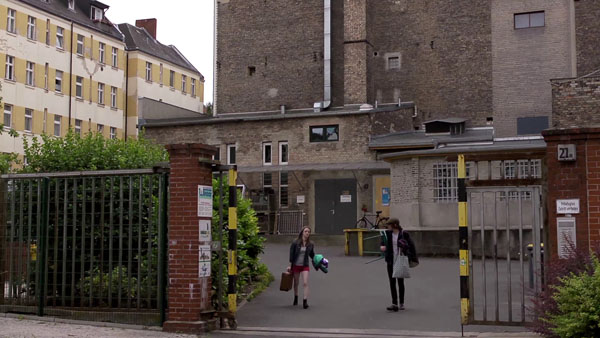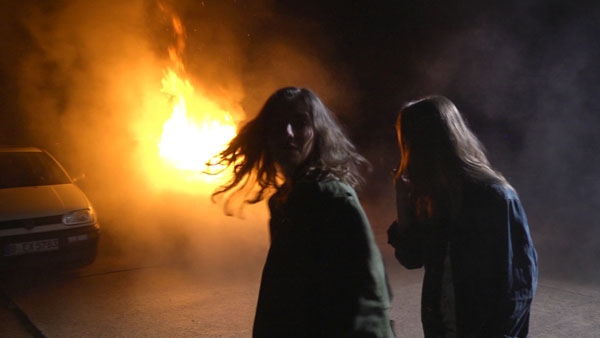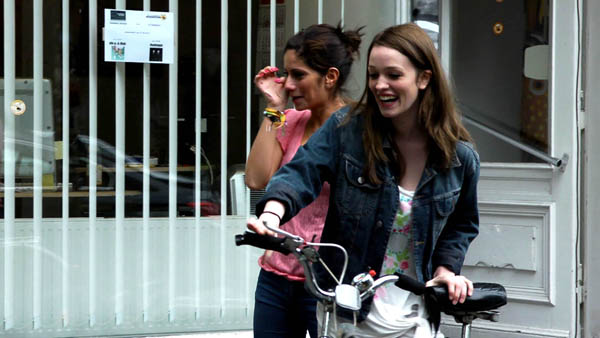Right towards the end, this year’s Berlinale became, for me, the this-is-your-life edition. If you’ve read the entry on Boyhood, you may have done a bit of math (but heavens, why would you?) and noted a considerable gap between the Texas and Berlin years. Many of those years were spent in Munich, and for several of those years, I performed with and occasionally wrote for minimal club, co-founded by Stephan Geene, whose umsonst has premiered in the Forum Expanded program. So right up front, full disclosure.
The title of Stephan’s followup to his first feature, After Effect (2008), might be translated as it is at the official site, as “for free” (i.e., “no charge” for “free for the taking”) or, as it is in the Berlinale catalog, “for nothing” (expending effort to little or no effect). The lower-case, open-to-interpretation “umsonst” is indicative of the sort of wordplay Stephen mastered in the texts he wrote during the minimal club years, taking full advantage the building-block nature of the German language, wherein prefixes and suffixes can be slid up and down a sentence in such away as to completely derail it, at least in terms of where you thought that sentence was heading when it pulled out of the station.
The milieu of umsonst is a neighborhood Berliners are calling Kreuzkölln, where I lived in the early Oughts, back when it was far less hip than it is now. I half-expected Stephan’s camera to wander on up to our old apartment. At any rate, we open with a tune sung to a street-side audience by Chloë Lewer, half of the indie-folk band Charity Children, originally from New Zealand (and who, having busked in Berlin for a few years, now have a new album out). The other half, Elliott McKee, plays Zach, who wanders the markets, bargains with Turks, dives a couple of favorite dumpsters, and, despite reading children’s books to teach himself German and Turkish, tells his friends he aspires to nothing and that he’s perfectly fine with that.
Zach’s staying with a woman (Vivian Daniel) whose daughter is off in Portugal—until, out of the blue, she’s not. Aziza (Ceci Chuh, who also happens to play the lead in a feature my daughter’s currently editing) won’t explain why she’s returned and, as she helps Zach carry his stuff to his next way station, asks him if his mother would do such a thing, i.e., rent his room out while he was gone. No, he answers, his mother is far too private a person. This word “private” is key (in a film minimal club made in the mid-80s, half the couple at its core diagnoses the problem with their relationship: “too private”). In the unwritten, unspoken code of the circles in which Zach and Aziza move, ownership, property and privacy, while not exactly taboo, rank rock bottom. A line that drew a good round of laughter from the audience Friday night: “You can’t just move here to Berlin, send the rents soaring, and then not hand out a few beers.”
I have to wonder if Stephan didn’t slip the word “private” to Elliott McKee. Probably not, since nearly all the dialogue in umsonst is improvised and the characters are, in a sense, co-creations of Stephan and his cast. I cannot stress what a radical departure this approach is from that taken in all the other work of his I’m familiar with. A widely published theorist who’s translated the likes of Derrida and Rancière, Stephan, back in the minimal club days, would rehearse us to the nth degree in the precise delivery of each line and the placement of each strategic pause. It’s not that he’s gone all mumblecore on us by any means (though I can’t help thinking that umsonst would fit quite nicely in a SXSW lineup)—for one thing, the overall rhythm of umsonst is very different indeed from those of the films made by that set of then-young American directors in the mid-2000s—but he’s taken a cue from the neighborhood itself. In the Q&A, Stephan said that he took a look around Kreuzkölln and found that he liked the way the people he saw there were spending their time. It’s as if, after the financial crisis of 2008/09 (in his director’s statement, Stephan calls it a “so-called crisis”), as the system fattens the elite and does its best to shut out everyone else, this bunch has simply decided not to be bothered.
Aziza’s crisis is entirely personal in nature; it’s never explained, but that explanation is not missed. As her mother tries to get to the bottom of it, tension flares within what’s clearly a pretty tight bond, and it’s in these scenes—mother and daughter, stumbling into fights neither wants—that Chuh and Daniel reveal their respectively unique talents as actresses. And then, a line is crossed. The mother reads Aziza’s diary, and in retaliation, Aziza reads her mother’s, which sends her into a sort of panic. Rushing up to the camera, close and dark, she tells us that she never, ever should have cracked those covers. Is there such a thing as privacy after all? Of course. The trick is to feel out its topography on one’s own rather than reading the map you’ve been handed.
The direct address to the camera brings up the framing device in umsonst that I’m not entirely sure what to do with other than enjoy, namely, the poetry of the director of the film-within-the-film in his early scenes (somewhat reminiscent of Truffaut’s Day for Night) and the slapdash anarchic humor of the final scenes (more reminiscent of Monty Python and the Holy Grail). With or without these buffers between us and the world of Aziza and Zach, umsonst is a remarkable portrait of a neighborhood, its community and its moment.
And I’ve spent more words and time on it than I’d originally planned, so there’ll be one more Berlinale 2014 Diary entry after all.
For news and tips throughout the day every day, follow @KeyframeDaily on Twitter and/or the RSS feed. Get Keyframe Daily in your inbox by signing in at fandor.com/daily.






